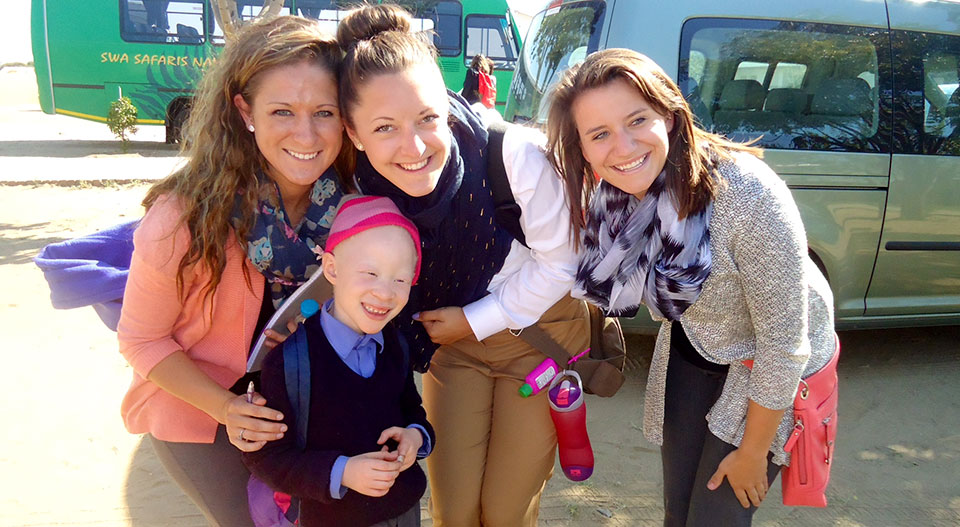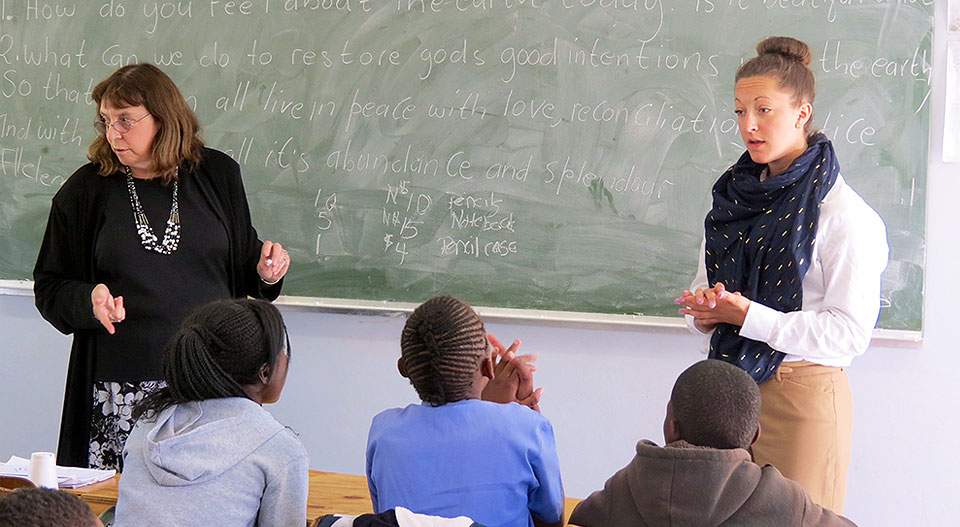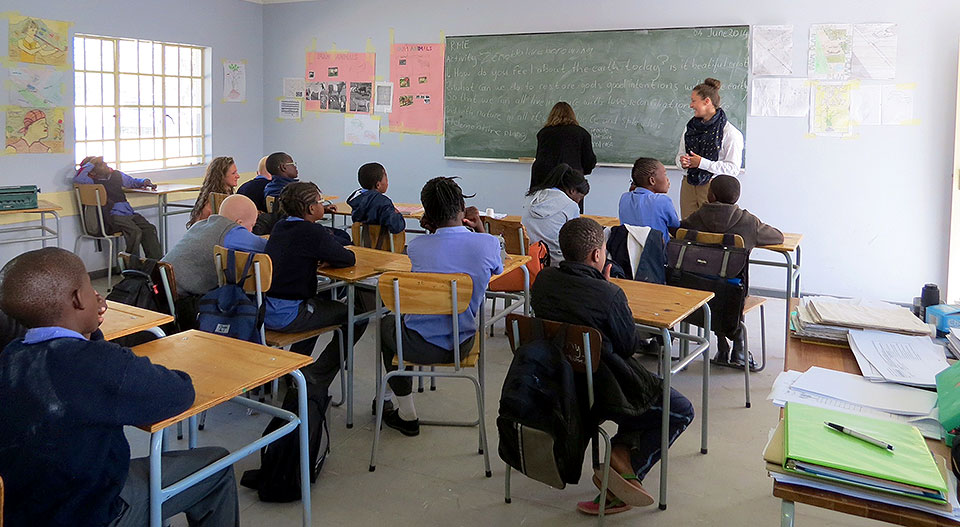

Today, our first day of school, is hard to put into words. We arrived at the National Institute for Special Education (NISE) around 7:30 a.m. and were greeted by squeals and smiles and waves from the bus. It took all of 10 seconds to receive dozens of hugs. It is winter here in Namibia so the days and nights are a chilly 30 degrees Fahrenheit. The days get up into the 80s with not a cloud in the sky. However cold this morning felt, our hearts melted on the school grounds. I can’t express the joy these children had in there eyes and the love they had in their hearts for complete strangers. It’s something you have to see to believe.
We began our day with a welcome from the principal, Marillize. Marillize is the wife of our driver extrodinar, Gustav, and has been in charge of running NISE for quite some time now. She is an inspiring women who has strong ethics, an unfailing passion for teaching and the biggest heart of hearts. She explained to us that she grew up rich. Rich in love, rich in understanding and rich in support. While the other university students went to observe some classrooms, Prof. Caro and the coaches, Chelsea, Allyson, and I, discussed the potential to implement some Positive Behavior Intervention and Supports (PBIS) programs and possibly administer a specific achievement test, The Woodcock Johnson Tests of Achievement (WJ III), used in special education referral. When asked what she expected from us, she was very adamant about the standard of teaching. She requires her staff to be to work on time, not African time (which tends to be late). She demands quality and emphasizes the math and reading areas of study. We will be getting a list of children she would like us to specifically observe, but we will also be giving different perspectives on how to improve the standard of teaching at her school. Surprisingly, not one of the teachers at NISE is trained specifically to teach students with visual impairments. All they have learned, they have learned through teaching, while teaching. They teach themselves how to Braille write and how to debraille (decode) the children’s writing. We were also informed that English is the 3rd or 4th language for most of these learners. They know multiple tribal languages (the “mother tongue”), learn the basics of English within the first three weeks of school, and start Afrikaans in grade 1. These cultural differences (gender, language, religion) cause some tension within the learners at first, but they come to realize that school it’s own culture and community. Respect is essential. During the 10:10 break, the group introduced ourselves to the faculty and they in turn introduced themselves to us. We enjoyed tea, coffee and biscuits in the staff room surrounded by many years of experience. We unloaded our humanitarian aid school supplies, from the bus, and were overwhelmed to see just how much generosity surrounds us via family, friends, and community. Each item will be cateloged and then distributed to the classrooms.

We were told that the grade 5 classroom was one in particular that needed to be observed due to behavior issues. We arrived at their agriculture class to find no teacher. Prof. Caro and I jumped right in, role playing a “Want vs. a Need” scenario. Prof. Caro would ask what I “needed” for school. The students would hint to me of the supplies they needed like pencils, paper, colors, rubbers (erasers) and school bags. The amount of money in Namibs was written next to the supply list and the students would have to calculate the price. Prof. Caro also asked me about some items that I may “want” for school and the discussion continued about distinguishing between a want and a need. Good thing we all previously created lesson plans in case of an absent teacher, but teaching is about flexibility, improvisation, and adaptation. We will be sure to bring our lesson plans tomorrow! By the time we got through our supply list, it was time for Afrikaans.

We spent the rest of the day with the 5th graders observing them in their language class, playing soccer in P.E. (again with no teacher present) and in mathematics. We wrote observations based on behaviors we saw demonstrated by certain students and the antecedents to these behaviors.
School ended in a prayer and all 16 of our group members met at the bus to go grocery shopping. We are served breakfast every morning, will need to bring our own lunches, and will switch off rooms for making dinner. We will eat family style each night. We took out money from the ATM in anticipation for our trip to the coast, Swakopmund in the Namib Deesert, this weekend. To give you an idea, US$1 is N$10.58.

There was a miscommunication with dinner reservation last night, but the hotel is planed an authentic game meal for our group … on the house! We ate springbok and oryx!
What an indescribable feeling seeing the kiddos for the first time today. They are truly lovers of learning: curious, bright and eager. Today may have been a tiny step in our journey, but it was the most anticipated and most important step. Much more to come and happy first day of school from Namibia!
“A little step may be the beginning of a great journey.”
-Taylor
Taylor Buresch, a senior special education major with minors in cognitive disabilities and Spanish, is blogging about her study abroad experience in Namibia, Africa.
